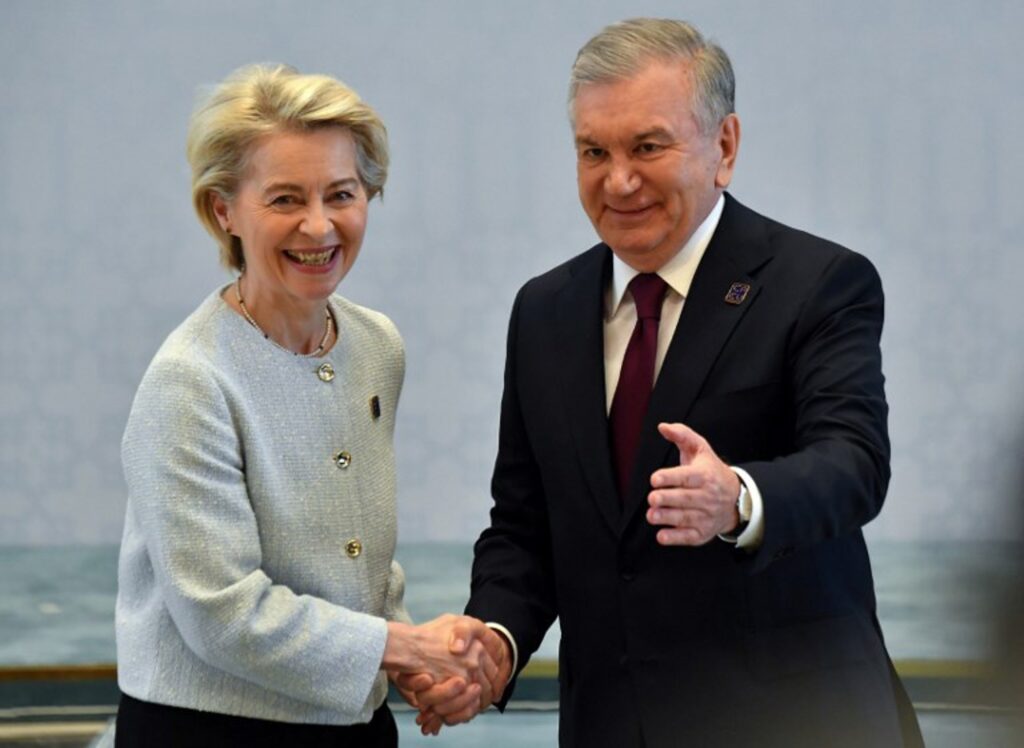The European Union praised the beginning of a "new era" in its relations with Central Asia at a summit in Uzbekistan on Friday.
The summit, the third 'European Union - Central Asia' meeting since Russia's invasion of Ukraine in 2022, witnessed the participation of European Commission President Ursula von der Leyen, European Council President António Costa, and leaders from Kazakhstan, Kyrgyzstan, Uzbekistan, Tajikistan, and Turkmenistan.
In Samarkand, an ancient Silk Road city in Uzbekistan, von der Leyen hailed the start of a new phase in EU-Central Asia relations, launching a "strategic partnership" described as a commitment to support each other.
Von der Leyen announced a €12 billion aid package for Central Asia under the EU's 'Global Gateway' infrastructure initiative, a counter to China's 'Belt and Road' project.
She highlighted four key sectors: transport, raw materials, clean energy, and digital connectivity.
The '5+1' format is also favoured by Russia, China, the United States, Japan, and South Korea, while Turkey is strategically positioning itself.
'Immense resources'
All major powers are interested in Central Asia's vast raw material reserves, a region as large as the EU but home to only around 80 million people.
"Your countries are endowed with immense resources," von der Leyen noted, emphasising Europe’s strategic interest in securing its supply of raw materials.
Uzbek President Shavkat Mirziyoyev praised the "profound and lasting transformation of Central Asia," highlighting the unprecedented collaboration between Central Asian presidents and European leaders.
For Central Asia, seeking to present a united front after decades of tensions, this rapprochement with the EU could provide advanced technologies that Russia and China cannot offer.
The EU, the leading regional investor (accounting for 40% of total investment) and the main development aid provider (around €550 million from 2021 to 2027), is crucial for this climate-vulnerable region.
Von der Leyen emphasised Europe's "unconditional partnership" approach, differentiating it from China, heavily involved in Central Asia's debt, and Russia, a significant energy and arms supplier.
However, China and Russia remain entrenched powers in the region, with China extending billions in loans for infrastructure projects, and Russia leveraging its historical ties.
Last spring, in, Russian President Vladimir Putin criticised Western attempts to disrupt traditional trade and cultural ties with Central Asia.
Related News
- Vietnam relaxes tourist visa rules after Belgium's state visit
- European stock market opens low on back of US tariffs
- Turning to Asia: Belgium strengthens ties with Singapore during three-day visit
Von der Leyen also stressed the importance of advancing the Trans-Caspian transport corridor project, a trade route bypassing Russia and linking Europe to Asia via the Caspian Sea.
Investing in infrastructure could enhance trade flows between Asia and Europe, although logistical challenges remain, as highlighted by Mirziyoyev.
The EU is Central Asia’s second-largest trading partner (22.6% of total trade), but this figure hides significant disparities between the countries.
Furthermore, the recent increase in trade between the EU and Central Asia conceals the issue of re-exporting Western-sanctioned goods to Russia.
Human rights issues in these largely authoritarian states, including the host nation Uzbekistan, were overshadowed at the summit, despite reports from NGOs about worsening conditions and the imprisonment of dissidents and journalists.

